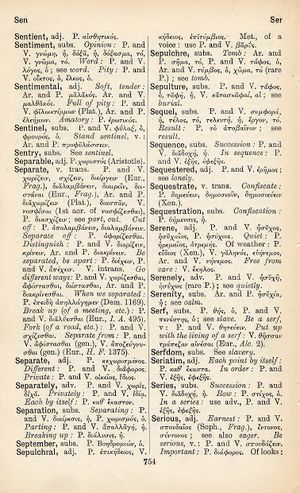separate: Difference between revisions
εἰ μὴ ἦλθον καὶ ἐλάλησα αὐτοῖς, ἁμαρτίαν οὐκ εἶχον → if I had not come and spoken to them, they would not be guilty of sin
(D_8) |
(3_12) |
||
| Line 35: | Line 35: | ||
{{Gaffiot | {{Gaffiot | ||
|gf=<b>sēpărātē</b>, seul<sup>t</sup> au comp. separatius : Cic. Inv. 2, 156, à part, [[plus]] spécialement. | |gf=<b>sēpărātē</b>, seul<sup>t</sup> au comp. separatius : Cic. Inv. 2, 156, à part, [[plus]] spécialement. | ||
}} | |||
{{Georges | |||
|georg=sēparātē, Adv. ([[separatus]]), [[doch]] [[nur]] im Compar., [[besonders]], quaedam argumentationes [[communiter]] et [[similiter]] tractabuntur, quaedam separatius ad finem adiungentur, Cic. de inv. 2, 156. | |||
}} | }} | ||
Revision as of 09:36, 15 August 2017
English > Greek (Woodhouse)
v. trans.
P. and V. χωρίζειν, σχίζειν, διείργειν (Eur., Frag.), διαλαμβάνειν, διαιρεῖν, δαστάναι (Eur., Frag.), Ar. and P. διαχωρίζειν (Plat.), διασπᾶν, V. νοσφίσαι (1st aor. of νοσφίζεσθαι), P. διασχίζειν; see part, cut.
Cut off: P. ἀπολαμβάνειν,διαλαμβάνειν.
Separate off: P. ἀφορίζεσθαι.
Distinguish: P. and V. διορίζειν, κρίνειν, Ar. and P. διακρίνειν.
Be separated, be apart: P. διέχειν, P. and V. ἀπέχειν.
V. intrans. Go different ways: P. and V. χωρίζεσθαι, ἀφίστασθαι, διίστασθαι, Ar. and P. διακρίνεσθαι.
When we separated: P. ἐπειδὴ ἀπηλλάγημεν (Dem. 1169).
Break up (of a meeting, etc.): P. and V. διαλύεσθαι (Eur., I.A. 495).
Fork (of a road, etc.): P. and V. σχίζεσθαι.
Separate from: P. and V. ἀφίστασθαι (gen.), V. ἀποζεύγνυσθαι (gen.) (Eur., H.F. 1375).
adj.
P. κεχωρισμένος.
Different: P. and V. διάφορος.
Private: P. and V. οἰκεῖος, ἴδιος.
Latin > English (Lewis & Short)
sēpărātē: adv., v. separo,
I P a. fin.
Latin > French (Gaffiot 2016)
sēpărātē, seult au comp. separatius : Cic. Inv. 2, 156, à part, plus spécialement.
Latin > German (Georges)
sēparātē, Adv. (separatus), doch nur im Compar., besonders, quaedam argumentationes communiter et similiter tractabuntur, quaedam separatius ad finem adiungentur, Cic. de inv. 2, 156.

